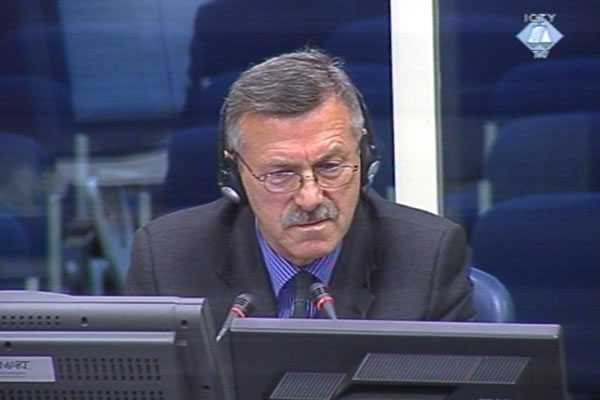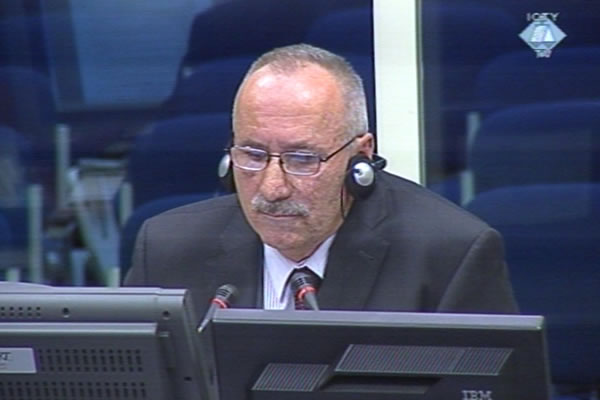Home
WHY COULDN’T BOSNIA BE EQUAL TO OTHER PARTS OF YUGOSLAVIA?.
Witness Vitomir Zepinic said that he and Karadzic privately shared the same view of Yugoslavia, feeling that it should be kept alive. Yet in public, the accused, as the SDS president, advocated a ‘rump Yugoslavia, a Yugoslavia which would include a Greater Serbia, a small or Greater Croatia and a divided Bosnia’. Zepinic asked the accused why his vision of BH didn’t see it as equal with Serbia and Croatia
 Vitomir Zepinic, defence witness of Radovan Karadzic
Vitomir Zepinic, defence witness of Radovan Karadzic In the re-examination of the pre-war BH deputy interior minister Vitomir Zepinic, Radovan Karadzic tried in every way he could to improve the defense’s position in light of what the witness had testified the day before. Zepinic had no kind words for the Bosnian Serb leadership. The only positive aspects of his testimony were the admission that the accused often defended him against the ‘SDS extremists who were even worse than him’ and the claim that the leaders of all three ethnic communities shared equally the blame for the war, although he did single out the Serb and Muslim leaderships. Other than that, the witness was less than forthcoming and did not help the former Republika Srpska president much.
In Zepinic’s words, before and during the war Karadzic was surrounded with ‘very bad people’. At least one of the government ministers – Momcilo Mandic – was a criminal. Zepinic said that those ‘bad people’ misinformed Karadzic about the events in the field, giving even the most banal bar brawl an ethnic spin and thus spreading fear and tension among the BH population. In an attempt to portray himself as s person incapable of committing the crimes he is charged with, the accused asked the witness if he knew that he, Karadzic, had non-Serb friends in Sarajevo. Zepinic said that in light of the ethnic structure in Sarajevo and BH, anyone who lived there ‘couldn’t have socialized with the members of just one ethnic group’. ‘You know very well, Dr Karadzic, that among the citizens of Sarajevo there was only one nation – citizens of Sarajevo. And that in Sarajevo nobody ever raised the issue of ethnicity’, the witness added.
Asked what the accused thought of Yugoslavia, the witness replied that in private conversations both of them shared the wish to preserve Yugoslavia. In his public appearances, however, Karadzic advocated a ‘rump Yugoslavia, a Yugoslavia which would include a Greater Serbia, a small or a Greater Croatia and a divided Bosnia’. The witness concluded his reply by asking why Karadzic’s vision of BH didn’t see it as equal with Serbia and Croatia.
After Zepinic completed his evidence, Karadzic called the wartime president of Rogatica municipality, Tomislav Batinic. Batinic’s testimony didn’t differ much from that of the majority of defense witnesses: he too denied the crimes of the Serb forces. In the summary of the statement read out by accused, the witness says that Muslims were responsible for the conflict. Muslims terrorized Serb villages and abused civilians, prompting Serbs to react, the witness stated. As part of the reaction, Rogatica was ‘liberated’ in July 1992 and the Muslim population went voluntarily to the center of the town, the witness explained. Muslims were put up in the secondary school building. That was not a prison camp but a collection center, he insisted. Batinic’s evidence would seem to indicate that the Serb refugees from other parts of BH felt safe enough in the houses that had been abandoned by frightened Muslims. In line with the decision of the municipal authorities, Serb refugees were ‘temporarily’ settled in these houses. The witness claimed that Muslims from ‘collection centers’ were taken to the territory under the BH Army control, which was what they wanted.
In the cross-examination, prosecutor Gustafson confronted the witness with the fact that many soldiers from the Rogatica Brigade were convicted before the BH State Court for crimes against local Muslims, mostly pertaining to the prison facilities. The prosecutor showed a document in which the Sarajevo-Romanija Corps commander Tomislav Sipcic warned the brigade commander in Rogatica Rajko Kusic to put a stop to ‘the cleansing of villages through massacre, rampage and abuse’. The prosecutor noted that Karadzic issued warnings calling for humane treatment of civilians, yet at the same time he promoted those soldiers of the Rogatica Brigade who had committed crimes. The witness for the most part answered he was unaware of the crimes and that he wasn’t well versed in military issues.
After Batinic completed his evidence, Karadzic called Tomislav Savkic, wartime president of the Serb municipality of Milici. He will continue his evidence tomorrow.
Photos

